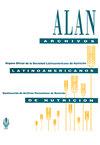Covid 19: Eating behavior changes related to individual and household factors during the COVID-19 lockdown in Spain
IF 0.3
4区 医学
Q4 NUTRITION & DIETETICS
引用次数: 3
Abstract
Objetive: To analyze the influence of individual and household factors on eating behavior (EB) and other determinants related to eating during the home lockdown in the Covid-19 pandemic. Method: Online survey (April 17 to May 10, 2020) to collect sociodemographic information, health, and various EB attitudes. Statistical analysis of the factors: country, setting, sex, BMI classification, lockdown period, a household with children under 15 years, nutritional needs, age groups, type and size household, monthly income, and religion. Results: 1055 households participated. 75% have modified their eating habits, with differences due to being overweight or obese in the person surveyed (p <0.05). Changes in EB and other lifestyles are influenced by household structure (p <0.001) and the effects that the pandemic has had on the economy of families (p <0.001). Compared to those who do not have them, households with children tend to plan much more meals, spend more time eating, seek a healthier diet, increase the number of daily meals, and look more at labeling. In contrast, people who live alone have worsened the hourly routines of the main meals. Conclusions: Confinement has modified eating behavior differently depending on the individual and domestic factors analyzed.新冠肺炎19:在西班牙新冠肺炎封锁期间,与个人和家庭因素有关的饮食行为变化
目的:分析新冠肺炎疫情居家隔离期间个人和家庭因素对饮食行为及其他饮食相关决定因素的影响。方法:在线调查(2020年4月17日至5月10日),收集社会人口统计信息、健康状况和各种EB态度。对因素的统计分析:国家、环境、性别、BMI分类、封锁期、有15岁以下儿童的家庭、营养需求、年龄组、家庭类型和规模、月收入和宗教。结果:1055户参与。75%的人改变了他们的饮食习惯,差异是由于被调查者超重或肥胖(p <0.05)。EB和其他生活方式的变化受到家庭结构(p <0.001)和大流行对家庭经济的影响(p <0.001)的影响。与那些没有孩子的家庭相比,有孩子的家庭往往会计划更多的膳食,花更多的时间吃饭,寻求更健康的饮食,增加每日膳食的数量,并更多地关注标签。相比之下,独居的人每小时吃一顿正餐的习惯更糟了。结论:禁闭对饮食行为的影响因个体因素和家庭因素而异。
本文章由计算机程序翻译,如有差异,请以英文原文为准。
求助全文
约1分钟内获得全文
求助全文
来源期刊
CiteScore
0.50
自引率
0.00%
发文量
31
期刊介绍:
Archivos Latinoamericanos de Nutrición (ALAN) is the official publication of the Sociedad Latinoamericana de Nutición (SLAN), for the dissemination of knowledge in the fields of food and nutrition, principally throughout the American Hemisphere. Articles in Spanish, English, Portuguese and French are accepted, both from the Society members and from nonmembers, in the following categories: 1. General articles (critical scientific reviews); 2. Research articles (originals); 3. Papers in applied nutrition (analytical results from intervention programs and discussion of reconmendations of practical application), and 4. Letters to Editor (short comments of general interest or about scientific facts and results previously published in Archives).

 求助内容:
求助内容: 应助结果提醒方式:
应助结果提醒方式:


